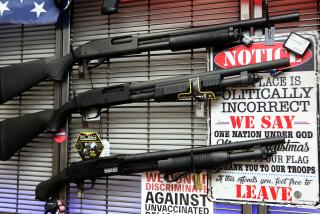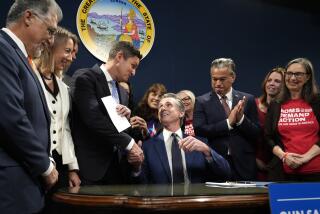Banning, Taxing Ammo: Can’t Hurt
- Share via
A gunshot wound often looks like a clean, tiny hole in the skin. But, as emergency room physicians know all too well, just below the surface the injury is likely to be anything but clean or tiny.
One appallingly common reason for the fractured bones, the torn arteries, the severed nerves, the shredded muscles inside the body is a perverse kind of bullet that is designed to disintegrate on impact. Because of the grievous injuries these bullets cause, and the skyrocketing cost of treating the victims, Sen. Daniel Patrick Moynihan is campaigning for a significant federal tax increase on this vile ammunition, plus a huge levy on those firms that manufacture or import it.
Among Moynihan’s targets is the nine-millimeter Black Talon, touted by marketers for its “tissue-cutting” and “crushing” action. The New York Democrat wants to increase the cost of a box of these bullets from $15 to $1,500, in effect taxing the ammunition out of the market.
His proposals would also increase federal taxes (to 50% from 11%) on .25-caliber, .32-caliber and nine-millimeter bullets and impose a license fee of $10,000 on manufacturers and importers of handgun ammunition (companies dealing with only police or other government agencies would be exempted). The legislation would raise a projected $200 million a year.
Consider that the treatment of shooting victims in Los Angeles County hospitals alone in 1991 cost $54 million. Local taxpayers paid most of the tab. On the national level, the public picked up 80% of the estimated annual expense related to gun violence--$16 billion.
Treatment that once took days and cost a few thousand dollars can now last months or even years, with multiple specialist evaluations, repeated surgeries, extended rehabilitation and in many cases permanent long-term disability assistance. That can boost the total bill for a single patient to hundreds of thousands, even millions, of dollars. And that adds to everyone’s health care costs.
No one is suggesting that taxes would pay for or solve the problem of gun violence. In fact The Times, in its series “Taming the Gun Monster,” notes that it is the huge number of privately owned firearms in the United States--about 200 million--that drives the demand for ammunition. Thus we call for a complete federal ban on handguns and assault weapons except for law enforcement. Special, restrictive arrangements would be made for legitimate collectors. Hunters’ rifles and shotguns would be separately licensed and regulated.
President Clinton has endorsed the ammunition tax in principle. Although he is concerned about tacking it onto the health care reform legislation, he is clearly warming to the issue. On Wednesday the President suggested that he might endorse an outright ban on the kinds of bullets Moynihan is upset about. Banning certain kinds of ammunition could prove to be an important if modest step in the right direction, too.
More to Read
Get the L.A. Times Politics newsletter
Deeply reported insights into legislation, politics and policy from Sacramento, Washington and beyond. In your inbox twice per week.
You may occasionally receive promotional content from the Los Angeles Times.










